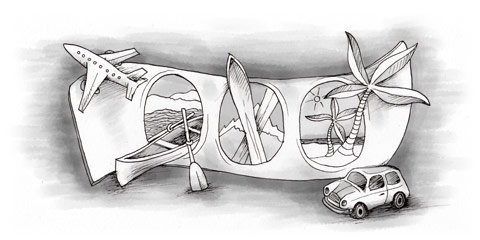Preparation
In Spain, you are legally required to have certain items and documentation in your vehicle:
- Driving Licence (Carnet de Conducir)
- Car registration document or rental document (Permiso de Circulación)
- ITV documentation (Ficha Técnica)
- Insurance policy document
- European Accident Statement (Declaración Amistosa de Accidente de Automóvil)
- Reflective jacket for all passengers
- Two warning triangles
Since third party insurance is mandatory, there is a wide range of insurance companies, but you might want to consider one that offers specific policies for expats and full services in English, like Línea Directa .
On the scene of the accident
If you are unfortunate enough to be involved in a car accident, the number one priority is safety and medical attention if required. Keep calm and try to remember the following checklist:
- Stop immediately and switch on your hazard warning lights
- Place two warning triangles, one 50 metres in front of the car and another 50 metres behind
- If necessary, e.g. when the road is partly or totally blocked, turn on your car’s headlights and direct traffic around the hazard
- Put on your reflective jacket before leaving the car and try to warn oncoming traffic of the danger
If anyone is injured, call 122 for an ambulance and police immediately. Don’t move an injured person unless absolutely necessary for safety reasons and cover them with a blanket or coat. Very important: If a motorcycle driver has been hurt, do not remove their helmet!
If there are no injuries and only minor damage to the vehicles, there is no need to call the police.
For insurance purposes
- If the police have been called, do not move the vehicle until their arrival
- If it’s necessary to move vehicles to unblock the road, mark their positions with chalk, take photographs of the accident scene or make a drawing showing the position of all vehicles involved before moving them (important for the report)
- All parties involved must exchange details: registration number, name, address and insurance company
- Check whether there are any witnesses to the accident and take their names and addresses
- If you have caused material damage and the owner is not there to report (crash with a parked car or into someone’s property), you must contact the nearest police station
- Don’t sign a statement, particularly one written in Spanish, unless you’re certain you understand and agree with every word
Accident report
In the case of a minor accident with no injuries, it is common that drivers complete an accident report form (Declaración Amistosa de Accidente). This form is an ‘amicable statement’, where drivers agree on what happened (and optionally, who was at fault - read the instructions on the form carefully). It isn’t obligatory to complete one and, if your Spanish isn’t up to it, you should refuse. You may, however, complete it in English or another language if you wish.
If police attend the scene of an accident, they will write their own report (atestado). This one is very important for the insurance and if you want to seek any indemnity or compensation.
Inform your insurance
Your insurance company must be notified of an accident within seven days and a delay may affect a claim. If there are injuries, make sure that the insurer is informed and provide them with a medical certificate.
You have two months to bring a charge against other parties involved. Bear in mind that, if a court case is required to decide the outcome, it can take years for a case to be heard.




